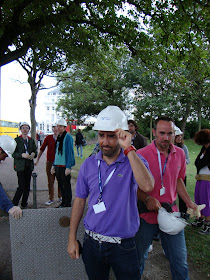Thursday, 7 July 2011
Brighton Sewer Tour - They Don't Make 'Em Like They Used To
As a Brightonian born and bred I'd like to say I have a pretty good knowledge of my fair city. I remember when Churchill Square was just a wind-swept concrete eyesore, when we had two functioning piers and when Brighton had a proper football stadium with atmosphere that you could walk to. Christ, I sound old.
Sure, shops and pubs may have changed hands over the years but essentially the town has retained a reassuring familiarity. Whilst, most of the changes have been for the better the one thing that hasn't changed is the Victorian sewer system dating back 150 years. I have walked over it all this time without giving it a second thought. This week I went on guided tour as I was curious to find out about this subterranean world.
Tours start at an inconspicuous gate by the Palace Pier. We are greeted by a avuncular Southern Water employee who is just the sort of salt-of-the-earth type I would expect on a sewer tour.
We are given a hard hat and a pair of latex gloves and made to watch a DVD with a hammy actress playing a Victorian bather explaining how the waters of Brighthelmstone (as it was then known) used to be famed for their medicinal qualities attracting visitors from miles around. Only they weren't so medicinal when bathers had to swim through tides of shit if they ventured to close to the outlet pipes. This forced the Victorian engineers to think up a solution to protect their precious asset.
As we enter the working part of the sewer the smell is not bad as you would imagine. In fact the toilet I went to in a post tour bar smelt worse. Our guide says it the tour isn't so fragrant on a Saturday after Friday nights beer and curry have taken their toll on the population's digestive system.
We are taken through the exquisitely bricked tunnels and its amazing to think that this marvel of civil engineering has needed virtually no maintenance since its was built. In fact one of the guides tells us the last time any work was done was just after WWII.
The sewer is still able to handle 100 million litres of water a day from the greater Brighton area. I was expecting to see turds bobbing up and down in the effluent but all the nasties are broken down to resemble nothing more offensive then a river of Minestrone. Looking up through vents you can see the cars rumbling over manhole covers just a few metres above you on the main coast road.
Health and safety legislation has even infiltrated underground as we can no longer be trusted to climb down ladders and are therfore prevented from going down a previously open section. A spiral staircase takes us down to the main tube which we are able to walk through. I can't help thinking you could make an atmospheric movie down here about mutant hordes who crawl out into the streets at night and devour drunken passers by.
As a kid I remember that on stormy days the sea would have huge areas of scum, condoms and tampons floating merrily along the surface as excess rain water would just mix with the sewage and pour out into the sea.
Southern Water put a stop to that in 2001 when they started work on Europe's largest storm water storage tunnel. Three miles long, six meters in diameter and thirty metres under the surface it is big enough to drive a double-decker bus through. It stores all the waste water that otherwise would flow into the sea and pumps it away to be treated. Further improvements are in the pipeline with a state of the art water treatment facility being built in Peacehaven that will be hidden underground.
At the end of the tour we climb up a ladder and emerge blinking by the Old Steine fountain. A drunken woman approaches the manhole curious to know who has just risen from the murky depths.
"We are mutant mole people and we have come to take over the earth!" I proclaim.
As regular street drinker she has obviously seen worse and unimpressed totters back to her bottle of White Lightning.
Brighton Sewer Tours cost £12 and run Weds and Sat from May to September. For bookings check out http://www.southernwater.co.uk/





No comments:
Post a Comment